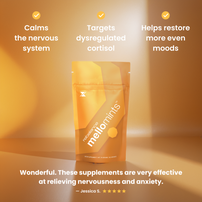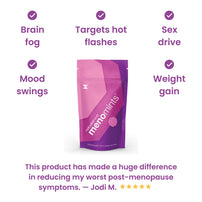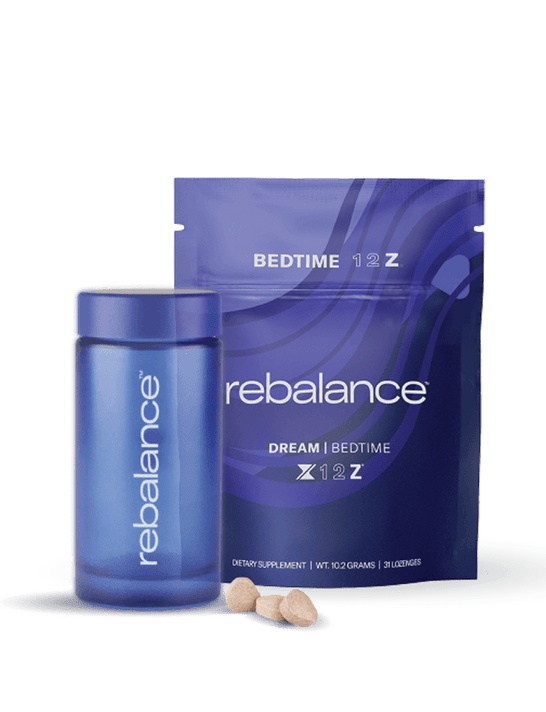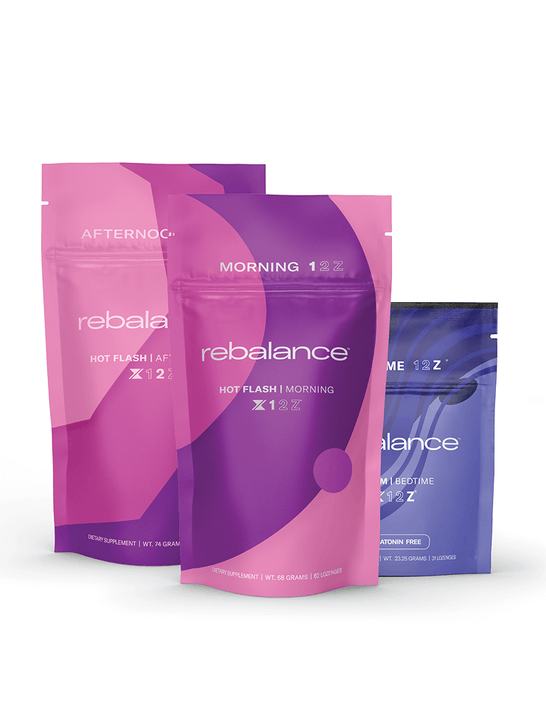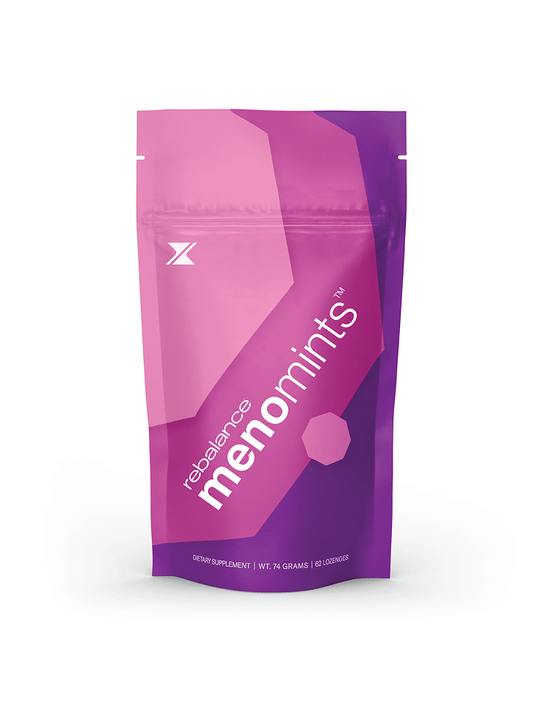How Does Menopause Affect Hormone Imbalance?
10/24/2022 by Anna Meyer

INSIDE THIS ARTICLE:
1. Demystifying Menopause: What is it?2. Symptoms of menopause
3. What Happens to Hormones During Menopause
4. Tips for Finding Relief from Menopause Symptoms
5. What does balance look like during Menopause?
You’re working out regularly, eating right, and doing everything you can to stay healthy and fit - but suddenly, you’re not seeing the results you used to. Your clothes are tighter, you’re feeling more anxious, and out of the blue your partner is breathing too loudly. What’s going on? It could be menopause and your hormones are off kilter. But how does menopause affect hormone imbalance?
Demystifying Menopause: What is it?
Menopause is a process that all women go through as they reach middle age. It usually begins in the late 40s or early 50s and is caused by a decline in the production of estrogen and progesterone - two of the hormones that regulate the menstrual cycle.
A woman will go through three stages of menopause: perimenopause, menopause, and post-menopause.
Perimenopause is the transition phase into menopause, and can last anywhere from a few months to a few years. During this time, women may experience irregular periods, hot flashes, night sweats, mood swings, and other menopause symptoms.
Menopause is the point when a woman has not had a period for 12 months in a row. This is the phase of life when hormone production declines sharply, and women experience the majority of menopause symptoms. Chronically elevated cortisol levels can also cause a woman’s period to stop. Therefore, if your period has stopped and you’re not sure if it’s chronic stress or menopause, consult with your doctor for a proper diagnosis.
Post-menopause is the phase after menopause. Women in this stage of life may still experience some menopause symptoms, but they are usually less severe. Additionally, women in this stage have an increased risk of developing certain health conditions, such as osteoporosis and heart disease.
Symptoms of Menopause
Due to the hormonal changes caused by menopause, a woman in any of the three stages of menopause can experience a variety of complications and symptoms, including:
Insulin May Become Less Effective
During menopause, insulin becomes less effective at regulating blood sugar levels. This can lead to an increase in cravings for sugary and starchy foods plus weight gain—particularly around your waistline.
Unfortunately your golden age doesn’t mean you can eat like a teenager and come out unscathed– bummer right? Plus, decreased insulin sensitivity may mean that your doctor will have to prescribe medicine to help regulate your glucose levels or adjust your dosage if you are already on medication for diabetes.
Testosterone Levels May Drop
Around the time of menopause, many women experience a gradual decline in testosterone levels—the hormone responsible for maintaining muscle mass and bone density. Lower testosterone levels can lead to fatigue, depression, anxiety, and loss of sex drive—all of which can make it harder to find the motivation to stay active and to keep things steamier in the bedroom. Rebalance's Women's System has ingredients to help increase testosterone appropriate to a woman's hormonal balance.
Hot Flashes Are a Thing, But They Don't Have to Be
You may start feeling like someone is messing with the thermostat, cranking up the heat. It's not them, it's your hot flashes. Estrogen levels decrease as you move through the stages of menopause. As a result, your hypothalamus goes into hypersensitive mode with temperature fluxes. This is all part of the great whirlwind of hormone imbalance. But when you bring cortisol – a master hormone that is all over the place along with the rest of your hormones – back into balance, you allow other hormones to naturally increase their production. One of those is estrogen, With the increase of estrogen and the more stabilized cortisol, you now have a way to reduce, if not, get rid of those hot flashes.
Rebalance's Hot Flash System is scientifically proven to reduce hot flashes, and in some cases get rid of them completely. It's also the only natural, non-HRT solution to hot flashes available.
Thyroid Function May Decrease
Menopause can also cause changes in thyroid function during menopause due to declining estrogen levels. And since the thyroid regulates metabolism, it can lead to weight gain. Thyroid dysfunction can also lead to fatigue, hair loss, and brain fog.
Other Symptoms Menopausal Women May Also Experience:
- Night sweats
- Mood changes
- Insomnia
- Vaginal dryness
- Dry skin
- Heart palpitations
What Happens to Hormones During Menopause?
We know that women stop menstruating when they enter menopause, but what happens to a woman’s hormones during menopause?
The Hormones Affected During Menopause
There are three main hormones that are affected during menopause: estrogen, progesterone, and testosterone.
Estrogen regulates the menstrual cycle and is the hormone that declines the most during menopause. Progesterone is another hormone that plays a part in regulating the menstrual cycle and also declines during menopause, but to a lesser extent than estrogen. Finally, testosterone levels also start to dip around the time of menopause, but this decline is usually gradual.
Do Hormones Go Back to “Normal” After Menopause?
It’s a common question: Once a woman hits menopause, do her hormone levels go back to pre-menopausal levels?
The answer is no. Menopause marks the end of a woman’s reproductive years and signals the permanent decline in estrogen and progesterone production. This means that hormone levels will not naturally go back to what they were pre-menopause. While these hormone fluctuations are less than ideal, they provide an excellent opportunity to squeeze some extra TLC and pampering out of your loved ones. Feel free to exploit it– we won’t tell on you!
Tips for Finding Relief from Menopause Symptoms
By now, you’ve likely realized that menopause is far from being a walk in the park. In fact, it’s probably akin to Frodo’s journey to destroy the Ring in the fires of Mount Doom – or at least the hot flashes will make it feel that way. So what do you do as a menopausal woman trying to live a comfortable, healthy life? Although there is nothing you can do to prevent menopause, there are a few things you can do to reduce your symptoms and manage this new phase of your life.
Get Plenty of Exercise
Exercise can help relieve symptoms of menopause by reducing stress levels and improving sleep quality. It can also help reduce the risk of developing chronic diseases such as heart disease, stroke, and osteoporosis. Plus, it’s a fantastic way to get some me-time and unwind.
Follow a Healthy Diet
A healthy diet is important for everyone, but it’s especially important for women who are approaching or going through menopause. Eating plenty of protein, high-quality fats, fruits, vegetables, and whole grains can help reduce hot flashes and other menopausal symptoms. Additionally, avoiding processed foods and sugary drinks can help keep your weight in check and improve your overall health.
Don’t Use Tobacco Products
Smoking cigarettes or using other tobacco products can cause a variety of health problems, including an increased risk of cancer and cardiovascular disease. It can also aggravate symptoms of menopause, such as hot flashes and vaginal dryness. If you currently smoke tobacco products, quitting is one of the best things you can do for your health—at any age.
Experiment With Supplements
Adding supplements to your balanced diet may help relieve menopause symptoms and may prevent certain diseases like osteoporosis. Some common supplements to consider include calcium, vitamin D, black cohosh, and red clover. Alternatively, a supplement system like the Rebalance Hot Flash System can help address multiple menopause symptoms, including mood changes, sleep problems, low sex drive, and hot flashes. The Hot Flash System contains flaxseed, which not only helps to boost testosterone levels for a better sex drive, but studies have found that flaxseed is also effective at reducing hot flashes by 57%. As always, consult your doctor before introducing any new supplements into your regimen.
Many women find that making lifestyle changes, such as eating a healthy diet, exercising regularly, supplementing, and managing stress effectively, can help minimize menopausal symptoms. So all hope is not lost if you are menopausal.
What Does Balance Look Like During Menopause?
It’s important to remember that every woman experiences menopause differently, and there is no “right” or “normal” way to feel during this time. However, some women find their symptoms improve when they take steps to promote hormone balance and counteract any symptoms they may experience.
Finding the right balance for your body during menopause will take some trial and error, but with a little perseverance, you can manage your symptoms and lead a normal, comfortable life. Although you may not be completely symptom free, you may be able to calm the extremes that come with menopause by following the tips provided. And who knows, maybe your partner can start breathing again.
Whichever approach you choose will depend on your individual situation - but there are options available so you can feel like yourself again.
Overview

Stay Calm. Sleep Deep. Wake Clear.
A lozenge that supports deep sleep, better REM, and calmer nights. Without melatonin — unless you want it.



